Meet Later Dad Peter Mutabazi: Interview by Robin Gorman Newman
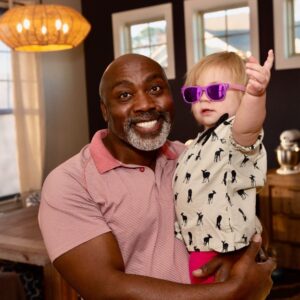 AGE: 49
AGE: 49
RELATIONSHIP STATUS: Single
RESIDENCE: Charlotte, North Carolina
AGES OF YOUR CHILDREN:
- adopted kid 17
- Foster kids: 9, 8, 8, 7, and 21 months
Peter Mutabazi is an entrepreneur, an international advocate for children, and the founder of Now I Am Known, a corporation that supplies resources that encourage and affirm children. A single father of two and foster dad to many, Mutabazi is a former street kid who has worked for World Vision, Compassion International, and the Red Cross and has appeared on media outlets such as the BBC and the TODAY show. A passionate and popular speaker, he currently lives in Charlotte, North Carolina.
Link: https://nowiamknownfoundation.org/
What was your road to parenthood like? What compelled you to foster children and make that your life’s mission? I grew up in a very abusive home in the worst poverty conditions in Africa. I ran away and became a street kid, where I learned to work very hard. Stealing was easier while we were working, and the people wouldn’t abuse us when we were doing a job.
A family began to feed me after my first few years on the streets. It took a long time for me to trust them and believe they had my best in mind, but they fed me every day and kept coming back. After a few weeks of this, they offered to put me in school and help get me off the streets—I did not believe their offer was genuine. I took another year and a half to accept their generous offer. They first met my basic needs, ensuring I was fed, then set me up in a boarding school.
They spoke words of affirmation over me—Peter, you belong. Peter, you are kind. Peter, you are unique. And eventually, I began to believe them.
After my own foster family experience, I traveled the world, stayed with various host families, and met foster families around the globe. I always maintained a strong passion for giving back to children in need and sharing the exact words of affirmation with them—you are loved, you belong, you are known, you are seen.
Tell us about your new book. Now I Am Known tells my life story in all its glory and points people toward hope in a broken world. My book gives you a behind-the-scenes look at my life from street kid to foster parent and how I overcame all the challenges. It’s a story of redemption, grace, and second chances—and if it can inspire one to live a day in hope instead of despair, then publishing it was worth it!
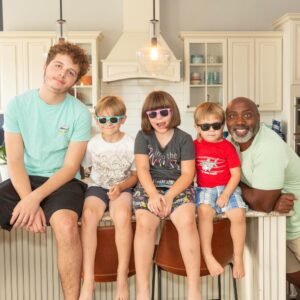 What have you learned about yourself since becoming a father? Before I was a dad, I didn’t know what I had the capacity for! I thought maybe I would get to help one or two children, but no—I’ve called to father 34 children as a foster dad. I doubted myself and didn’t feel qualified, but practicing fatherhood taught me that I could do more than I knew!
What have you learned about yourself since becoming a father? Before I was a dad, I didn’t know what I had the capacity for! I thought maybe I would get to help one or two children, but no—I’ve called to father 34 children as a foster dad. I doubted myself and didn’t feel qualified, but practicing fatherhood taught me that I could do more than I knew!
When it’s time, I can let go through the reunification process. When it’s time, I have more space to expand and accept one more child. When it’s time, I will find the right words to say. So the journey of being a foster dad has taught me to trust me and that I’m stronger than I ever thought.
Being willing to learn as I go has made foster parenting a joy!
Do you think it is challenging to balance parenting, a personal life, and professional pursuits? Any tips to offer? It is possible to juggle it all! Before I was a parent, I felt overwhelmed by all the to-do’s on my list. But now, as a single dad, I’m constantly amazed at how much I multitask now as a parent. It teaches you to develop your brain to work on multiple planes at all times and manage stress differently. Parenthood is no different than being a professional… the things I learn as a parent, I get to use in a business setting, and the things I learn as a parent help me in business.
Being a parent has made me a better, more patient businessman. It’s taught me to lean on others and delegate to trusted people when possible. It’s taught me to choose my battles and what arguments matter. It’s taught me that people aren’t usually frustrated with me when I get an attitude—they’re just human beings like my moody kids! They still deserve dignity and respect, and being a parent helps me practice that in my personal and professional life.
What was your inspiration to launch the NOW I AM KNOWN FOUNDATION? From growing up on the streets to living and traveling around the world and landing in the affluence of the United States, I have always maintained a desire to give back. I was rescued from the streets, and my foster dad taught me always to look for the best in people, for ways you can help those around you—just like he helped me.
It took years to get a place emotionally and financially where I could bring children into my home. Still, once I got to that place and was able to help children in need as a foster parent and then eventually adopt my son—I’ve never looked back. I saw my foster dad’s example of how kind he was to his family, how kind he was to me, and I wanted to be just like him. So, I took him up on his offer to send me to school, and his example and inspiration changed my whole life.
The Now I Am Known Foundation serves as the means to change the world through foster care. We equip new foster parents with training and community, help new families with new placements get the essential items they need, and help teens who have aged out of care make a fresh start. I desire to see foster children know their value and inherent worth—the foundation allows me to reach people worldwide and champion the cause!
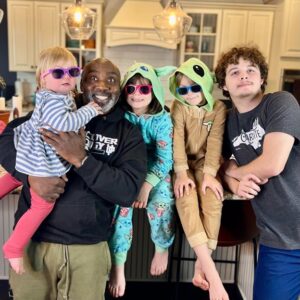 What do you see as the positives and challenges of becoming a single dad at age 35 or over? As a single person, I never considered other people in my decision-making. I made decisions quickly, changed plans a lot, and just lived day by day. With kids, that all changes—I’m in charge of the plan. So I had to change my mindset from taking care of myself to providing structure and purpose for kids (or at least an intentional environment).
What do you see as the positives and challenges of becoming a single dad at age 35 or over? As a single person, I never considered other people in my decision-making. I made decisions quickly, changed plans a lot, and just lived day by day. With kids, that all changes—I’m in charge of the plan. So I had to change my mindset from taking care of myself to providing structure and purpose for kids (or at least an intentional environment).
Being a single parent has also revealed how self-reliant I am (or was). I don’t like to ask for help, and I have gotten good at fending for myself. But as a dad, I need all the help I can get! The sooner I ask for help, the better it is for me. I’m learning to practice that slowly but surely. I try to think through problems or challenges by myself, but as a parent, I’m always learning that bringing another sound, wise, reasonable adult voice into the mix is necessary for me. Isolating does not make me strong—it reveals my blind spots. So I try to make it a practice to bring in other trusted adults for problem-solving.
Loneliness can undoubtedly be a challenge at times. Having younger kids keeps me on their schedules most of the time. Most of the day, I’m giving, giving, giving… and it’s a conscious effort to remember that I need people to pour back into me!
Parenting has forced perfectionism out of me. I became a parent at an older age, so I’m coming off many decades of getting things right! I’m perfectionistic, and in parenting—that’s not possible!
The biggest reward for parenting is feeling like I belong. I belong to my kids. They need me, and they need my role. I have a purpose in being a dad, and it’s the most content I’ve ever been.
Are you conscious of raising your children to be a Mensch (decent, responsible person)? The family that took me in as a street kid didn’t instruct me. They simply let me live alongside them and learn how to be decent by being in their life. I want my kids to be kind—so I model being kind, even when frustrated or in a stressful situation. I want my kids to try their best to be patient—so I model patience, express when I feel tense, and show them how to do it.
I spend more time with them than anyone, so they watch my example. I try to be very conscious about what I’m modeling for their future. I have to be the voice of reason and model how to live a healthy lifestyle. Most of these kids come from traumatic home situations, so it’s even more important to me to show them that you can live life in a patient, loving, conscious, and intentional way.
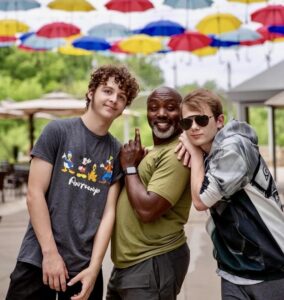 How do you practice self care and role model for your family? You can’t pour from an empty vessel—as a parent. You must be filled up to pour into your home’s kids. That means laying down the dad’s guilt when I’m sitting still. It means allowing myself to put down the parenting role when the kids aren’t around. To sit on the couch and watch my favorite show with a sink full of dishes behind me (and not feel guilty about it). To sit in the car at carpool pickup and not even check my email… just to give myself a second of downtime.
How do you practice self care and role model for your family? You can’t pour from an empty vessel—as a parent. You must be filled up to pour into your home’s kids. That means laying down the dad’s guilt when I’m sitting still. It means allowing myself to put down the parenting role when the kids aren’t around. To sit on the couch and watch my favorite show with a sink full of dishes behind me (and not feel guilty about it). To sit in the car at carpool pickup and not even check my email… just to give myself a second of downtime.
I must find things that fill, encourage, and strengthen my soul. As I said, that might be watching a movie without feeling guilty about the dirty house or hiring a babysitter and giving myself a night off. I find ways to meet my needs, relax, and let myself be.
Being a role model is how I want my kids to act when they grow up. I say “yes” a lot—I listen to what they want to do and what they enjoy. We go outside when they want; I like making their day and teaching them that life is joyful and fun! Sometimes I have to say “no,” but in general—I always hear my kids tell sitters, “Well, Dad lets us _______” because I do!
A big part of self-care is modeling that to our children. Sometimes, I tell my kids, “Dad needs some time alone to think,” and take a moment to myself. They’ve heard me say, “Dad is not here right now. He needs to refill”—and they always understand that. They are open and understanding to give me time to recoup for a moment, and being honest with them allows them to be honest with me when they can’t be fully present, either. I’m modeling the healthy expression I hope they have with their emotions one day.
What is the best advice you can offer a “later dad or mom” who may have self-doubt? You are capable of more than you can imagine! Before becoming a dad, my brain could only do a certain number of tasks, and since becoming a parent, I’m miraculously able to think through, problem solve, and manage 3-to-5 times more tasks on my to-do list. When kids’ schedules and needs come into the picture, your brain expands to find extra space to help meet those needs. Trust me—if you desire to be a parent and decide to do it, you will not only have all the mental and emotional capacity you need to love that child, you will have MORE than you need! The love that child gives back to you will radiate through you and pour right back over them.
What do you wish you had known when you first became a father that you know now? I wish I knew that all these kids need unconditional love. I felt utterly insufficient as a “dad” when I first began training as a foster parent—lacking in every way! I didn’t have the coolest toys or a fantastic home. I didn’t know anything about being a parent, but I knew I wanted to help—and I wish I could’ve told young Peter that that was enough.
Showing up for a child, being present with them, and speaking positively and lovingly to them is all they need from me. And the love they give back to me is more significant than any gift I could ever give them!
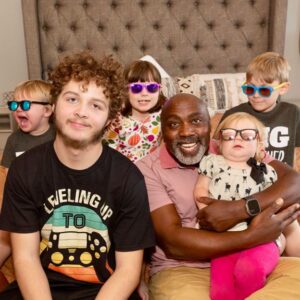 What words of wisdom would you offer someone contemplating parenthood over age 35, especially if they are single? Do not listen to other parents tell you how hard it will be—listen to yourself first. Believe what you know you are capable of. Everyone will have an opinion and want to share it—so be sure you know what you think before you listen to anyone else’s advice. When I first wanted to foster, many negative people told me it would be too stressful or wouldn’t be what I truly wanted—but I knew that helping kids find a safe, loving home again was my life mission.
What words of wisdom would you offer someone contemplating parenthood over age 35, especially if they are single? Do not listen to other parents tell you how hard it will be—listen to yourself first. Believe what you know you are capable of. Everyone will have an opinion and want to share it—so be sure you know what you think before you listen to anyone else’s advice. When I first wanted to foster, many negative people told me it would be too stressful or wouldn’t be what I truly wanted—but I knew that helping kids find a safe, loving home again was my life mission.
I’ve learned to be proud of my decisions, even when people question me, because I’m doing my best to make wise, fruitful decisions for my kids. And I can feel good about that and know those outsiders’ opinions aren’t as crucial as the life-changing family we are a part of in the Mutabazi tribe.
Another two pieces of advice—have zero expectations and be a willing learner. When we have expectations, we set ourselves up for disappointment. As a parent, I find it best to hold my relationships with my kids loosely and have zero expectations for them. That means I don’t expect them to be in a decent mood when they wake up! Whatever we encounter, we will do it together, and teaching my kids that nothing they do will ever disappoint me has been a compelling way to show them how loved they are.
The other part of having no expectations is that I have to be a willing learner. My kids constantly show me new, more effective ways to parent or communicate with them. I need to be willing to learn from them and our interactions and adapt as we go along.















